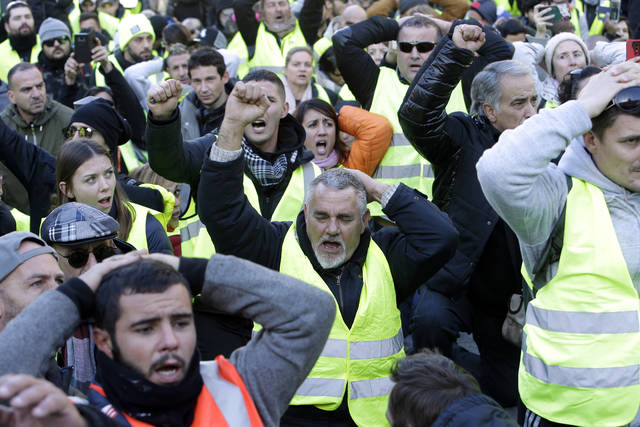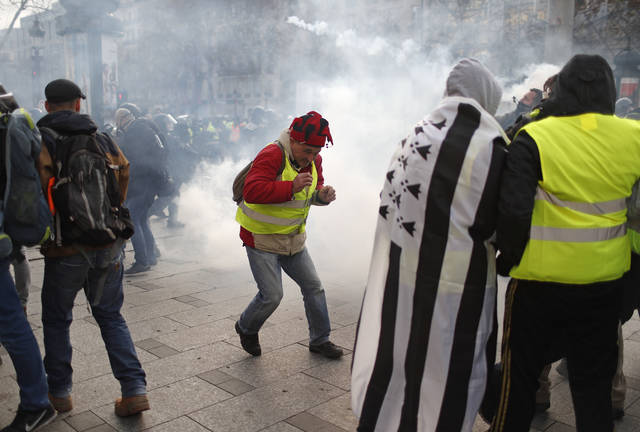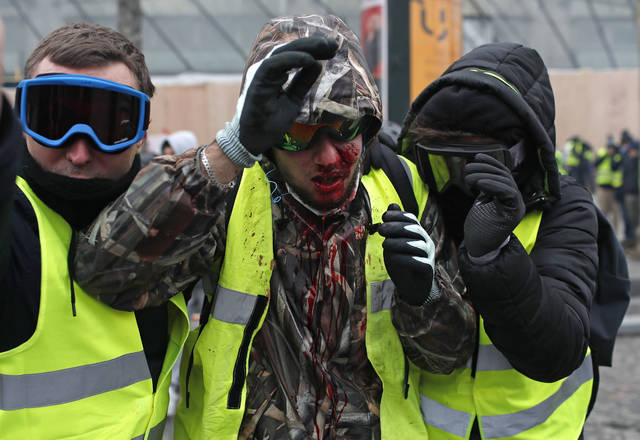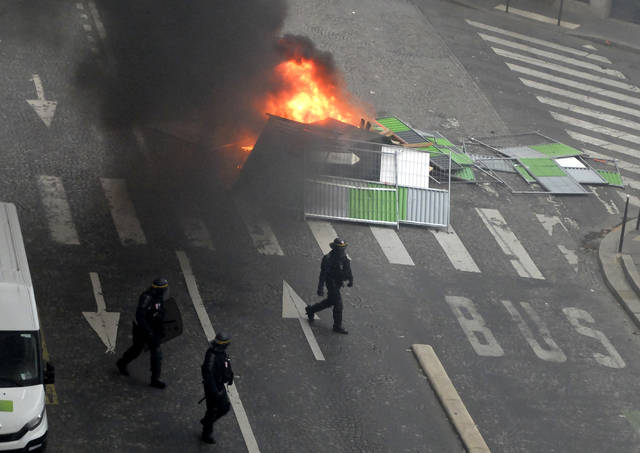French police fire tear gas in Paris to halt angry protests




PARIS — French riot police fired tear gas and water cannon in Paris on Saturday, trying to stop thousands of yellow-vested protesters from converging on the presidential palace to express their anger at high taxes and French President Emmanuel Macron.
PARIS — French riot police fired tear gas and water cannon in Paris on Saturday, trying to stop thousands of yellow-vested protesters from converging on the presidential palace to express their anger at high taxes and French President Emmanuel Macron.
Security officials imposed a lockdown on parts of central Paris, determined to prevent a repeat of the rioting a week ago that damaged a major monument, injured 130 people and tarnished the country’s global image.
Blue armored vehicles rumbled across cobblestone streets from the Arc de Triomphe across toward eastern Paris as scattered demonstrations spread around the city. Police were mounted on horses and surrounded protesters with trained dogs. A ring of steel surrounded the Elysee Palace itself, as police stationed trucks and reinforced steel barriers in streets throughout the entire neighborhood.
Associated Press reporters witnessed multiple protesters hurt in Saturday’s clashes with police. Paris police said 30 people were injured, including three police officers. An AP video journalist was wounded in the leg as police fired tear gas and rubber bullets on the Champs-Elysees.
Some stores along the Champs-Elysee had boarded up their windows with plywood, making the neighborhood appear like it was bracing for a hurricane. Angry protesters on Saturday tried to rip the boards off.
Protesters threw flares and other projectiles and set fires but were repeatedly pushed back by tear gas and water cannon. By mid-afternoon, more than 700 people had been stopped and questioned, and more than 400 were being held in custody, according to a Paris police spokeswoman.
Despite the repeated skirmishes, Saturday’s anti-government protests appeared less chaotic and violent than a week ago, when crowds defaced the Arc de Triomphe, set vehicles ablaze and looted high-end stores in the city’s worst rioting since 1968.
Prized Paris monuments and normally bustling shopping meccas were locked down Saturday at the height of the holiday shopping season. The Eiffel Tower and Louvre Museum were among the many tourist attractions that closed for the day, fearing damages amid a new round of protests. Subway stations in the center of town were shut down.
The yellow vest movement — named after the fluorescent outerwear French drivers must keep in their vehicles — started as a protest against higher taxes for diesel and gas, but quickly expanded to encompass wide frustration at stagnant incomes, the rising cost of living and other grievances.
Macron on Wednesday agreed to abandon the fuel tax hike, which aimed to wean France off fossil fuels and uphold the Paris climate agreement, but that hasn’t defused the anger.
After two weekends of violence in Paris that made the authorities look powerless, police went into overdrive Saturday to keep a lid on unrest. Police frisked people or searched bags throughout central Paris, and confiscated gas masks and protective goggles from AP journalists.
Protesters who came to Paris from Normandy described seeing officers block yellow-vested passengers from boarding public transportation at stops along their route. The national gendarme service posted a video on Twitter of police tackling a protester and confiscating his dangerous material, which appeared to be primarily a tennis racket.
Macron’s government had warned that the yellow vest protests had created a “monster” and that Saturday’s protests would be hijacked by radicalized and rebellious crowds.
Demonstrators waving French flags, shouting the French anthem and wearing the movement’s signature neon vests gathered before dawn Saturday near the Arc de Triomphe, then tried to march down the Champs-Elysees Avenue toward the presidential palace.
Rows of helmeted, thickly protected riot police blocked their passage down the Champs-Elysees toward the heart of presidential power. So the protesters tried other routes, marching through the prime shopping district that includes the high-end stores of Galeries Lafayette and Printemps and the Palais Garnier opera house.
National police estimated the number of protesters in Paris on Saturday at 8,000, among 31,000 protesters nationwide. They appeared to be outnumbered by police, with 8,000 officers deployed in the capital alone and 89,000 fanned out around the country.
The yellow vests include people with views that range from the far right to the far left. The group has no leaders but is united in its feeling that Macron and his government are out of touch with the concerns of ordinary French families.
“We are here to tell (Macron) our discontent. Me, I’m not here to break things because I have four children so I am going to try to be safe for them, because they are afraid,” protester Myriam Diaz told the AP. “But I still want to be here to say ‘Stop, that’s enough, this has to stop.’”
Cyril, a garbage truck driver in Normandy who earns 1,430 euros ($1,625) a month, said Macron’s mistake was trying to reform France too quickly.
“I don’t want to have kids because I have trouble feeding myself, let alone another mouth,” the 25-year-old told the AP, saying he came to Paris to demonstrate and “defend myself.”
Interior Minister Christophe Castaner urged calm.
“I ask the yellow vests that want to bring about a peaceful message to not go with the violent people. We know that the violent people are only strong because they hide themselves within the yellow vests, which hampers the security forces,” he said Saturday.
Four people have been killed in accidents since the unrest began Nov. 17. Christmas markets, national soccer matches and countless other events have been canceled due to the protests.
Protesters also blocked roads, roundabouts and tollbooths elsewhere in France. Offshoot movements have emerged elsewhere, and yellow-vest protests were held Saturday in Belgium and the Netherlands.
U.S. President Donald Trump sought to fuel the anger in France, seizing the moment to criticize the Paris climate accord, which he is abandoning.
“People do not want to pay large sums of money … in order to maybe protect the environment,” he tweeted.
Many economists and scientists, however, say higher fuel taxes are essential to saving the planet from worsening climate change.
———
Srdjan Nedeljkovic, Philippe Marion and Milos Krivokapic contributed.

